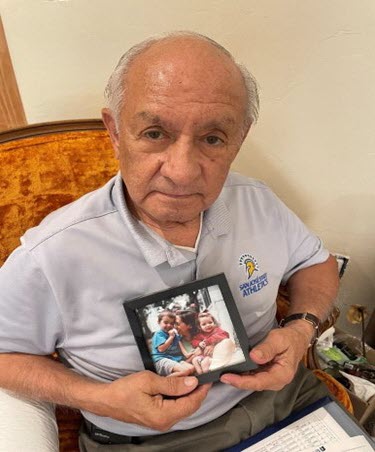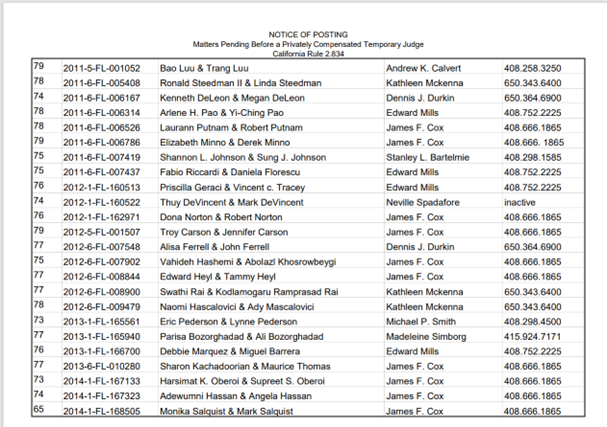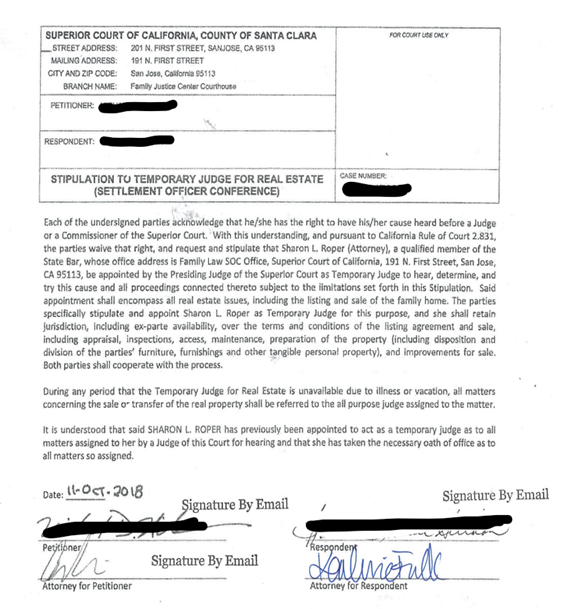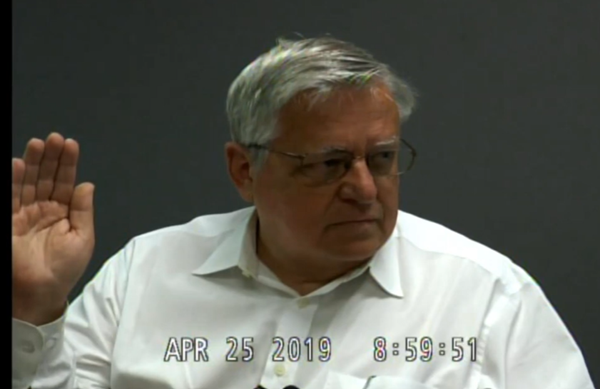

By Fred Johnson and Susan Bassi
Former U.S. Marine, Richard Garcia, has faced a number of challenging life events over his 80 years. At the age of nine, he tragically lost his mother. Later, his son was killed in a motorcycle accident shortly after heading off to college. Then, shortly after his grandchildren were born, his daughter succumbed to ovarian cancer. In 2016 Richard’s marriage deteriorated and he hired an attorney to assist him in filing for divorce that same year. Now, seven years later with no finalization of that divorce in sight, the battle Richard faces this Veteran’s Day is against his divorce attorney, Mark Erickson.
Richard is suing Erickson for malpractice and fraud. His lawsuit alleges that Erickson committed negligence and fraudulent acts, was dishonest, performed subpar legal work, and caused Richard to be charged unnecessary legal fees and costs. All of which occurred after Erickson convinced Richard to hire attorney Michael Smith as a private judge, instead of continuing in the  public court system.
public court system.
Seven years after Mark Erickson assured Richard that hiring Smith would make his divorce proceedings cheaper and more straightforward, Richard is still not divorced, and has not resolved divorce-related real estate matters with his former wife, despite having been charged tens of thousands of dollars for his attorney and a private judge’s fees and costs.
Julia Minkowski is also suing her divorce attorney, James Hann, for malpractice. Like Erickson, Hann convinced Julia to hire Michael Smith as a private judge, repeating the mantra that it would be cheaper and faster than utilizing the less costly public court system.
Shortly after Hann obtained Julia’s consent to use Smith as a private judge, he abandoned her as a client because she could not afford to pay his legal fees and costs. While Julia was forced to represent herself, Smith ordered her to liquidate assets to pay him. Julia would not have lost those assets if her matter had continued in the public court system. Like Richard, nearly four years after she agreed to use Michael Smith as a private judge, Julia is still not divorced, is unrepresented and is struggling to protect her half interest in the family home.
Both Julia and Richard are part of a growing class of litigants suing their attorneys for malpractice and fraud after their attorneys forced them to hire private judges in connection with their divorce cases.

Divorce Attorneys Dupe Clients into Private Judging and Overcharge for Subpar Legal Work
Divorce lawyers often blame public court judges, court backlogs and lack of public funding to pressure clients into agreeing to use a private judge in their divorce case. These attorneys deceive their own clients by representing the use of a private judge is cheaper and faster than public court. Such claims are not supported by court files. In fact, court records suggest the opposite, showing private judge cases often take longer and cost more.
No statistics on the cost and use of private judges in the state have been kept since 2004.
In the malpractice case Richard brought against Mark Erickson, the lawsuit alleges Erickson billed large sums in questionable legal fees, failed to do basic discovery and never objected to outrageous, unethical conduct involving the private judge that caused Richard actual harm.
In San Mateo County, divorce attorney Ester Adut has been sued for malpractice after one of her clients claimed she overbilled and breached their contract in connection with a family law matter. The case is ongoing, but far from uncommon when it comes to complaints about divorce attorneys.
A Vanguard investigation of hundreds of family law cases revealed that divorce attorneys frequently fail to file legal objections, fail to conduct basic discovery, fail to file appropriate legal pleadings and fail to make good faith efforts to settle cases, needlessly dragging cases out for years. Especially when a private judge is in the case.
Private Judges Sell off Family Home to Pay Divorce Lawyers
In several private judge cases audited by the Vanguard, the family home was abruptly ordered sold by a private judge. Court files in those cases show equity from the family home was used to pay the attorneys who had pressured their clients to use, and pay, the private judge.
Once an attorney is brought into a case as a private judge, the private judge is wrapped in immunity and typically cannot be sued. Therefore, divorce clients who lose family homes, or other assets, in connection with a private judge may typically only seek to offset their losses by suing their own lawyers.
In the public court system, the family residence can only be ordered sold if it is in jeopardy of going into foreclosure or being lost through some other means. In Santa Clara, divorce lawyers are known to use court employee Sharon Roper to act as a private judge, at public expense, in order to facilitate the sale of a family home.
Court documents audited by the Vanguard show Roper has facilitated the sale of family homes in order to assure payment for attorneys who claim to have earned fees in a divorce case where there are no other assets to pay them.
As part of her court duties, Roper is also responsible for maintaining the list, or docket, of divorce cases moved out of public court to attorneys paid as private judges. There have been numerous irregularities in the posting of the lists managed by Roper especially where local attorneys, including Michael Smith, are involved.
None of Smith’s private judge cases, including Richard’s, were posted in the courthouse by Sharon Roper before 2020. As a result, litigants, including Richard, had no way to evaluate Smith’s performance as a private judge or to learn of other private judge options.

After a family home is ordered sold, proceeds from that sale are typically ordered to be deposited in attorney trust accounts, rather than held in a segregated account in trust for the litigants as is required by law.
Attorney Trust Accounts
Attorney trust accounts are intended to hold small amounts of money for short periods of time. A review of court files shows divorce attorneys are being allowed to use their trust accounts to hold millions of dollars generated from the sale of a family homes during divorce proceedings.
Interest earned on lawyer trust accounts, “IOLTA”, is paid to the bar, not to the families whose home equity created the interest income generated when funds were held in an attorney trust account. The state bar has repeatedly refused to investigate complaints that divorce lawyers are mishandling funds deposited in their trust accounts.
Previously, the state bar announced plans to audit attorney trust accounts. Under this state bar policy, there have been reports of audits of civil attorney trust accounts, yet there have been no reports of such audits of family law attorney trust accounts, despite those accounts being known to hold sizable deposits resulting from the sale of a family home.

Divorce Attorneys in Deposition
Few malpractice attorneys sue family law attorneys. One malpractice attorney, who wished to remain anonymous, noted that by the time a divorce case has been mishandled by an attorney, the injured client has likely missed the statute of limitations for malpractice or is too financially and emotionally drained to pursue another lawsuit. However, if a litigant can sue for malpractice then they are entitled to take the deposition of the attorney.
In one malpractice case, the client was allowed to take the deposition of his former attorney, Brad Baugh. During his deposition Brad Baugh falsely testified he had served in Vietnam. After carefully detailing his time in the service, his deposition was fact checked by reporters who confirmed Baugh had never served in the military. Complaints about Baugh’s false statements made under oath (the definition of perjury) were ignored by the Alameda, Contra Costa and Santa Clara County District Attorneys.
Shortly after his 2019 deposition, Baugh retired from the practice of law and went inactive at the bar. Mark Erickson reported that Baugh continues to attend family law events where Baugh could pick up business as a mediator or private judge where a law license is not required.
During the forty years Baugh worked as a Silicon Valley divorce attorney, he regularly used private judges in divorce cases. He was also regularly appointed as minors’ counsel to represent children whose parents were involved in a divorce.
In a deposition connected to a malpractice lawsuit brought by a former client, Baugh was asked to restate information he had told his client about serving in the military and the number of “kills” he had. Baugh, who never served in the military stated, under oath, “I was responsible for the death of enough people to assure my place in hell”
Private Judges and Increased Malpractice Claims
Hundreds of family law litigants have complained about the private judging system in California, noting they were told by their attorneys that private judging would be cheaper and faster, which was not the case. Duped spouses claim they were never informed that they didn’t need to use an attorney at $350–1200 per hour as a private judge in order to get divorced.
Attorneys generally lack the training and experience that public court judges possess. More concerning is that attorneys acting as private judges often have too many social, professional, and financial conflicts of interest that are never disclosed, as the law demands.
An investigation of private judge cases statewide shows that none of the private judges notice their hearings, properly handle legal documents, or provide public access to the hearings as required by law. Furthermore, these cases often see exorbitant fees charged to the parties without public court judges reining them in.
At the time Mark Erickson advised Richard to use Michael Smith as a private judge, Smith had no cases listed on the private judge list in the Santa Clara County courthouse. None of the hearings where Smith’s orders were issued were noticed on the docket in Richard’s or Julia’s divorce cases. Similarly, in San Mateo, where Smith also reportedly works as a private judge, no list showing Smith’s cases was posted.
Information obtained by the Vanguard indicates Erickson will sit for a deposition in Richard’s malpractice case on Veteran’s Day this year.
This article is part of Vanguard’s expanded reporting on family court. To support this reporting, please donate, subscribe and advertise your business online in the Vanguard. For tips, or consideration in future reporting, please email Susan Bassi or send mail and tips to P.O. Box 2220 Los Gatos, CA 95031.
